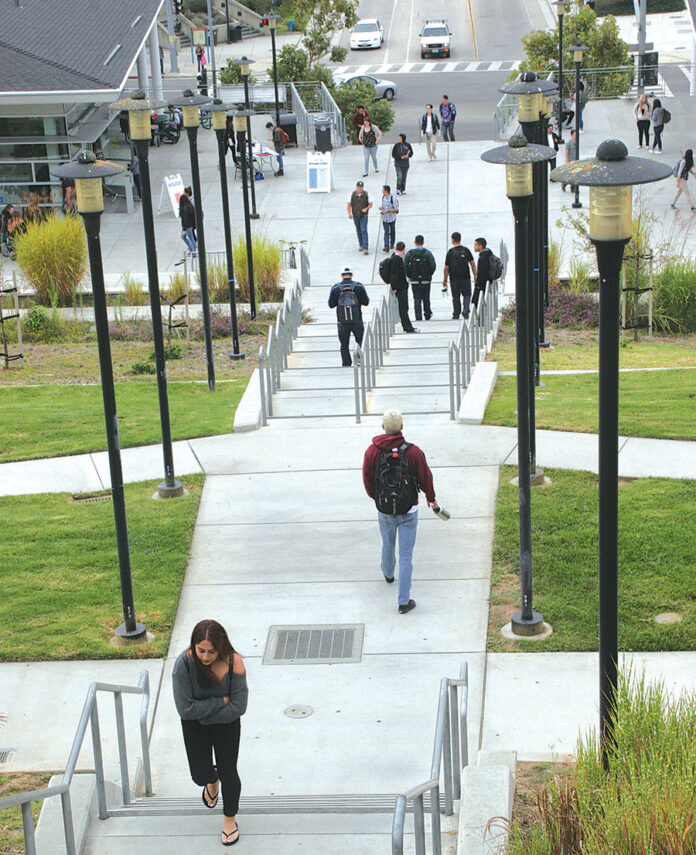When Covid-19 began to sweep the U.S.—and brought with it an economic recession—Cabrillo College officials expected a jump in enrollment that typically comes with a battered economy.
But the college is now seeing a significant drop in those numbers, which it pins on the double calamity of the pandemic and the CZU August Lightning Complex fires, along with a lower birth rate that affected the current generation of incoming college students.
The enrollment numbers are expected to improve somewhat after the winter semester begins on Jan. 25, Cabrillo spokeswoman Kristin Fabos said.
Still, according to Cabrillo President Matt Wetstein, enrollment in the current semester is down 18 percent from last year, which he said is similar to what happened during the fall 2020 semester. That’s when the CZU Complex in September displaced hundreds of residents from their homes in the Santa Cruz Mountains, affecting an estimated 30 percent of Cabrillo’s students.
“We went from about 10 percent down to 18 percent down in the course of a week.” he said.
Wetstein worries that some of those numbers might not rebound. Sonoma County lost about 2,000 residents after the 2017 Tubbs Fire.
“I would anticipate that we’re going to lose 100 to 200 students permanently, based on the patterns I’ve seen,” he said.
The downward trend is the same for both two- and four-year colleges across the U.S. According to the National Student Clearinghouse Research Center, community colleges showed a nearly 19 percent drop in enrollment in the fall, while public four-year colleges saw a 10.5 percent drop.
A recent survey of Cabrillo students who dropped classes showed that 27 percent said it was because they don’t like online classes, while 19 percent said it was concerns over Covid-19. Meanwhile, 14 percent listed the fire as a reason.
The decline is affecting nearly every discipline, particularly in the college’s Visual and Performing Arts department. Adult education and ESL classes have also taken a hit, as residents affected by the Covid-19 crisis struggle to make ends meet, Wetstein said.
“If you’re choosing between going to school or putting food on the table or buying medicine or whatever it is, I think understandably people are making economic choices for their economic survival and their household survival,” he said.
At the same time, the college’s science classes are showing higher-than-average enrollment, particularly in biology and chemistry. Wetstein attributes this in part to increased interest in health careers.
He also said the subjects gained more popularity after Dr. Anthony Fauci—the nation’s top infectious disease expert who served on President Donald Trump’s Coronavirus taskforce—famously sparred with the president over the importance of Covid-19 safety measures such as mask-wearing. Wetstein called this “the Fauci effect.”
Compounding all of this, Wetstein said, is that the college was already looking at declining enrollment before the fires and the pandemic hit. Numbers of students have steadily dropped, from 17,252 in the 2016-17 school year, to 16,173 in 2019-20.
“We’re entering a period in Santa Cruz County, and pretty much nationally, where there is a slight downward trend in high school graduations that are expected anyway,” he said.
That means that Local Control Funding Formula based partially on enrollment could take a commensurate hit, which could lead to “catastrophic” cuts within 2-3 years,Wetstein said.
“We’re not alone,” he said. “We’re in a statewide and a national downward slope in community college enrollment across the board. Ours is just a little more significant.”
However, there was some good news announced Jan. 14, as Cabrillo said it would receive $8.8 million in federal funding thanks to the Coronavirus Response and Relief Supplemental Appropriations Act.
A minimum of $2.013 Million must be used to provide direct emergency grants to help students defray the costs of attending college. Cabrillo said it will work to disburse individual grants of roughly $500 to students as soon as possible, and that students could receive the money as early as February.
“This relief package will go a long way to providing some immediate economic relief to students and to our College,” Wetstein said.
In addition to the new CARES Act funding, Cabrillo received an anonymous $2.6 million donation on Jan. 12. The donation provides funds for 20 part-time peer-to-peer tutors yearly through the HUB, Tutoring and Academic Support Services.
Jessica Garcia, student and HUB tutor, said the program was an important tool for both students and tutors.
“I absolutely love peer tutoring and believe it can be just as beneficial to the tutor as it is for the tutee,” she said. “I have learned a lot about my own learning style and new ways to study for my own classes. As a tutor, I love making friends with my students and helping them get the most out of their learning experience here at Cabrillo.”
The donation was perfectly timed Annie Jones, Director of Tutoring and Academic Support Services, said.
“Tutoring programs not supported directly by grant funding had been cut by nearly 50 percent in fiscal year 2020-21,” Jones said. “These reductions led to fewer student tutors working… Students seeking tutoring were beginning to experience an increased delay in receiving some tutoring services.”
Peer-to-peer tutors engage with 300-500 students per semester.
“The impact of this donation is profound. It will provide a stable source of funding for our student tutoring and mentoring programs, helping to employ students and to strengthen our completion rates,” Wetstein said. “We know from research and data that these programs work wonders for students. The funding will also foster the development of countless future educators who can give back to our community. In that sense, the legacy of a gift like this goes on for many generations to come.”
Reporter Todd Guild contributed to this report.









